The Ultimate Guide To Sleep Training Your Baby
- by Brooke Williams
- Updated: January 3, 2023
Table of Contents

As a parent, you probably look forward to your baby’s major milestones. Their first steps, their first word—each new month of their first year might be marked with a photo or video shoot to remember the occasion. In fact, you probably wish you could stop time and keep your baby at this age for just a little while longer. There are so many precious moments that just seem to fly by.
But while there are some moments you wish you could freeze in time, you’re probably counting down the days until your baby will finally sleep through the night. The good news is there are ways to manage baby sleep regression and other regular baby sleep snafus, and sleep training might just be the answer! We’ll go over some tips and tricks so both you and your baby can get a good night’s rest.
What Is Sleep Training, And What Is It Not?
Sleep training, also known as sleep coaching, refers to the intentional practice of teaching your baby independent sleep methods. Since every baby and family is different, there are an array of sleep training methods a parent can use based on their comfort level and individual parenting style.
“There’s no cookie cutter approach. It’s very individual for a family,” says Amber LoRe, sleep consulting coordinator with Huckleberry.
Misconceptions About Sleep Training
On the flip side, Nicole Johnson, lead sleep expert for The Baby Site, says, “Sleep training, on the other hand, is not a technique to stop night feedings before it’s age-appropriate, not a license to ignore your baby’s needs, and not child abuse.”
Dr. Lynelle Schneeberg, licensed psychologist, fellow of the American Academy of Sleep Medicine, and author of Become Your Child’s Sleep Coach, echoes and elaborates on Johnson’s statement, saying some misconceptions of sleep training include the concern that it’s “harmful for the attachment bond and that it has to involve any long period of crying to be effective. There’s no evidence that brief periods of protest tears for a child in a loving home causes any harm.” In fact, studies show that sleep training results in better sleep for the infants and improvements in the child and family’s well being.
When Should I Start Sleep Training, And How Long Does It Take?
Schneeberg, says sleep training is safe after the six month mark for a normally developing child who is gaining weight properly, though other experts say parents may be clear to start as early as four months.
Experts recommend waiting until a baby is comfortably out of the newborn phase because they develop their circadian rhythm postnatally, meaning babies are still working to establish the rhythmic components necessary to regulate their sleep-wake cycle during the first few months of their life. However, there’s no set timeline required for sleep training — every family is different! The amount of time it takes to sleep train a baby will vary depending on the individual baby and the method used. But once a family begins to consistently sleep train, they can see real gains in a relatively short period of time.
“You can see significant progress in three to four days,” says LoRe. “Then, on the other hand, if you’re doing the slower, more gradual techniques and methods, that could take weeks or months depending on how fast a parent wants to go and how consistent they are. It’s really quite a spectrum.”
Can You Sleep Train For Naps?
Yes, you can sleep train for naps. However, there are differing schools of thought on whether you should sleep train for naptime and bedtime separately or simultaneously.
“I absolutely sleep coach for naps and nights at the same time,” says Erin Junker, pediatric sleep consultant and owner of the Happy Sleep Company. “There are differing opinions on that, but when I see parents who have tried to do it separately, I see parents who have been sleep coaching for a long time because they’re not having success with it—because their baby is confused.”
Junker noted that if you allow your baby to fall asleep independently at night, but rock them to sleep during the day, the inconsistency can lead to the baby not knowing what to expect in each sleep situation.
Other experts, like LoRe, suggest tackling sleep training for naptime and bedtime separately. “When you do sleep train, it can lead to some overtiredness at first when they’re learning these new habits,” says LoRe. “So to do it all at once can be overwhelming for everybody, and it can also lead to a lot of overtiredness, which just leads to more crying and can make the whole process more challenging,” she says.
Is Sleep Training Safe?
According to the Cleveland Clinic, sleep training is safe and healthy. In fact, research suggests it actually has many benefits, including improving parental mood and infant sleep quality.
What Is The Difference Between Night Weaning And Sleep Training?
Night weaning refers to the process of transitioning your baby away from bottle feeding or breastfeeding at night, while sleep training refers to teaching your baby to self soothe and fall asleep independently. While they can be done simultaneously, they don’t necessarily have to be. “I like to dispel the myth that sleep coaching has to mean removing all the overnight feeds,” says Junker.
Whether you night wean and sleep train simultaneously or separately will often depend on your baby’s age and nutritional needs. It’s recommended that breast-fed infants aren’t weaned from night feedings until 12 months of age, while formula-fed babies can begin weaning on those night feeds around six months of age.
Sleep Training Methods
The Cry-It-Out Method:
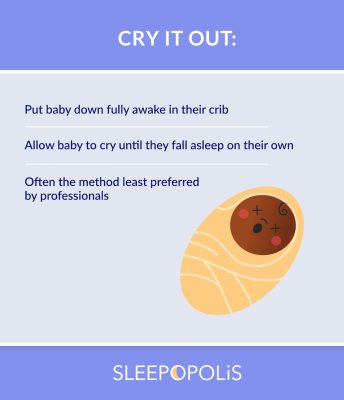
Like the name suggests, the cry it out method involves putting a baby down fully awake in the crib and allowing them to cry until they fall asleep on their own. Though it’s a recognizable method, it isn’t always the method favored by professionals — and it’s likely the method that has some parents branding the practice as cruel or neglectful. Dr. Pierrette Mimi Poinsett, MD, pediatrician and consultant for Mom Loves Best notes that this is because some researchers believe that prolonged crying may be harmful to the infant and the important bonding phase between parent and child. However, she also says there’s evidence that Cry It Out is not harmful to parental infant bonding.
Outside of concerns over any potential harmful consequences of Cry It Out, experts and parents consistently mention that leaving babies to cry it out can tug on the heart strings a little too much to be a plausible option for all parents.
“Every specialist recommends a certain range of time to leave babies while they learn a way to self-soothe,” says Schneeberg on different sleep training philosophies. “You don’t want to leave them so briefly that they don’t have a chance to learn this sleep skill but don’t want to leave them so long that it’s overly hard on the parent.”
If you do attempt this method, the length of time your baby will cry can vary. Some babies cry for only a few minutes, while others may cry for 45 minutes to an hour or longer before falling asleep on their own. However, the length of time your baby cries should decrease after the first few nights. Your baby should learn to fall asleep on their own with minimal crying or fussing within a few days.
If you are looking for a gentler approach to sleep training, there are alternative options you can try that involve more hands-on approaches.
Ferber Method (Also Known As Check And Console):
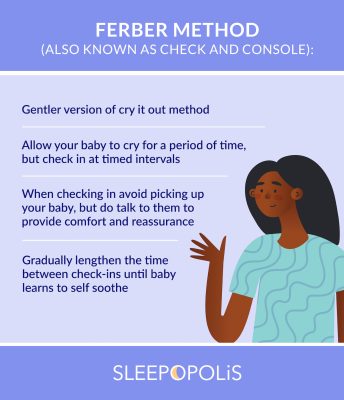 The Ferber method, which can also be known as check and console, is a gentler version of the cry it out method. With this method, you allow your child to cry for a bit but check on them at timed intervals. For instance, the first night you may let them cry for just a few minutes before going to check on them. Gradually, there should be more time between these intervals so your baby gets less accustomed to frequent visits and learns to self soothe.
The Ferber method, which can also be known as check and console, is a gentler version of the cry it out method. With this method, you allow your child to cry for a bit but check on them at timed intervals. For instance, the first night you may let them cry for just a few minutes before going to check on them. Gradually, there should be more time between these intervals so your baby gets less accustomed to frequent visits and learns to self soothe.
When checking on your baby you should avoid picking them up, but you can talk to them to provide comfort and reassurance. Over time, make your visits less frequent. For example, wait five minutes before checking on your baby, then increase it to ten minutes, and so on.
Likewise, start by letting them cry for five minutes the second night. Then wait ten minutes before checking on them again and after that, 12 minutes. By the third night, start with ten minutes and gradually increase the amount of time from there. You may find that your baby is able to fall back asleep on their own during this time period, or you may have to continue checking on them and pushing back the length of time between check-ins.
A prospective schedule for the first few days may look something like this:
First Night
First check-in: Wait three minutes
Second check-in: Wait five minutes
Third check-in and subsequent check-ins: Wait ten minutes
Second Night
First check-in: Wait five minutes
Second check-in: Wait ten minutes
Third check-in and subsequent check-ins: Wait 12 minutes
Third Night
First check-in: Wait ten minutes
Second check-in: Wait 12 minutes
Third check-in and subsequent check-ins: Wait 15 minutes
Pick Up, Put Down Method:
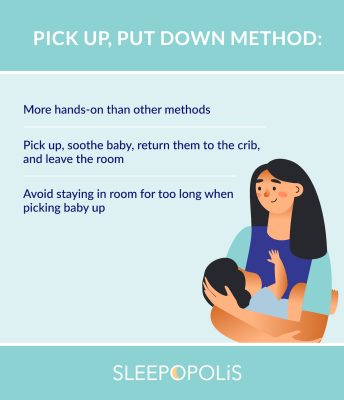
This method is more hands-on than other methods. It involves picking up your crying baby, soothing them until calm, and then returning them to their crib and leaving the room once they are asleep.
Repeat these steps as needed, but keep in mind that you don’t have to rush into the room at the first sound of your baby’s cry. You can wait a few minutes to see if they are able to fall asleep on their own. If not, then you can enter the room and soothe them. In this situation it’s key to make sure your child falls asleep in their crib instead of in your arms to avoid reinforcing a routine you’re trying to change.
Because the pick up, put down method is among the gentlest sleep training methods, it can take longer to sleep train a baby this way. However, if you have the time and patience, this can be an effective sleep training method for some. Keep in mind, though, that some babies may become overstimulated by being picked up so frequently.
Chair Method:
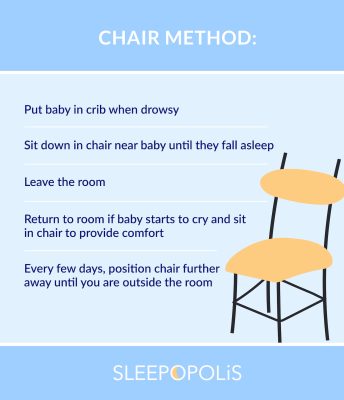
With the chair method, you should lay your baby down in the crib drowsy, but awake. Then sit down in a chair nearby and wait until your baby falls asleep. Once they do, you can leave the room.
If your baby starts to cry, you can return to sitting in the chair and provide comfort by talking to them until they fall back asleep. Repeat this process while moving the chair further away from the crib every few nights. Continue positioning the chair further away until you are completely outside the room.
While this can be an effective method for sleep training your baby, it can also be difficult for parents who have a hard time watching their child cry without intervention. If that sounds like you, then you can also try something known as the Sleep Lady Shuffle. This technique mirrors the Chair Method, but you can pat or pick up your baby when they start to cry.
Though the chair method can be impactful for some, Schneeberg also notes that not all babies will stay drowsy when you put them in the crib — some may feel wide awake as soon as they realize they’re out of your arms or not being rocked. “So it’s more realistic to say that a baby will need to learn how to go from fully awake to fully asleep on their own in the crib by self-soothing,” she says.
Bedtime Fading:
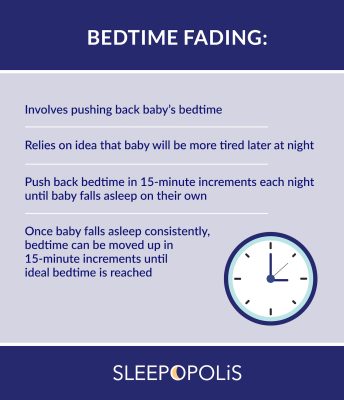
Bedtime fading involves pushing your baby’s bedtime back in 15-minute increments. This method is often preferred by parents who are looking for a gentler sleep training approach. The idea behind the bedtime fading method is that your baby will be more tired later in the evening and should have less trouble falling asleep.
Continue pushing your baby’s bedtime back in 15-minute increments until they are able to fall asleep on their own. Once your baby is falling asleep consistently, you can move the baby’s bedtime back up in 15-minute increments until the ideal bedtime is reached.
For instance, let’s say you lay your baby down to sleep around 7:30 each night. Keep pushing the bedtime back, first to 7:45 p.m., then 8:00 p.m., and so on and so forth. Write down the time your baby is falling asleep on their own each night.
Once you’ve reached the sweet spot—say your child falls asleep on their own at 8:30 p.m.—keep them on the schedule for at least a few days.
Now the goal is to gradually shift your baby back to their ideal sleep schedule. Once your baby is falling asleep consistently at 8:30 p.m., push their bedtime up to 8:15 p.m. Once they are falling asleep each night around 8:15 p.m, wait two to three days to push their bedtime back to 8:00 p.m, and so on until they’re back on the schedule that works for your family.
It’s important to note that experts have different stances regarding bedtime fading — some say it’s acceptable for infants, while others, like Schneeberg, caution that it may be better for older children who actively resist bedtime.
“The primary problem with this method is that overtired babies and children wake more frequently when they are overtired, ” says Johnson. “You may inadvertently make sleep even worse at night with this method.”
Sleep Training Tips
Break Any Sleep Onset Associations
“Every child has what’s called a sleep onset association, also known as a sleep crutch,” says Schneeberg. “In other words, the way you put your baby to sleep at bedtime is the way your baby will want to get back to sleep upon waking. If you rock him to sleep, he’ll wake up wanting to be rocked back to sleep.” She explains that this extends to all other sleep onset associations — rocking, nursing, and being carried or driven around can all become sleep onset associations in babies.
Of course, it’s natural to want to want to rock your baby and spend that close, quality time together before bedtime — Schneeberg simply recommends making sure nursing, rocking, or anything else you don’t want to do every time your infant wakes up isn’t the final step in their bedtime routine.
“Instead, rock and nurse them a bit before you plan on putting them down to sleep, and then add a couple more steps to conclude the routine like doing a final diaper change and then reading a book or singing a song before you put them into the crib,” she says.
Create A Consistent Bedtime Routine
Use bedtime cues, like singing a lullaby, playing soft music, or reading a story to let your baby know it’s time to go to bed. Getting into a consistent nighttime routine will help your baby recognize that it’s time to go to sleep.
Choose A Technique That Works For You And Be Consistent
Choose the method that works best for you and your parenting style. “You’re only going to see success if the parent is comfortable with the methods they’re using,” says LoRe.
What works for one family may not necessarily work for another, and that’s okay! Choose the technique that you feel most comfortable with and make sure all caregivers are on board with how best to execute your family’s sleep training plan.
Follow Your Child’s Sleepy Time Cues
Babies will typically give some type of visual cue that they’re tired. Whether it’s yawning, growing fussy, or arching their back, your baby is likely sending you sleepy signals. Use these visual cues to gauge an appropriate bedtime for your baby.
Lay Your Baby Down While Awake
Try to get your baby in a drowsy state when it’s time for bed. Your baby may naturally feel tired and send you cues such as yawning or increased fussiness. If your baby is sending you these cues, it’s time to put them to bed.
If your baby isn’t becoming tired on their own, you can use your own cues to signal that it’s time to sleep. Cues may include a nighttime bath, dim lights, or calming music. While you want your baby to be drowsy, be sure to put them down in their crib while they’re still awake. This will teach them to fall asleep independently rather than relying on you to soothe them to sleep.
Call In The Experts
If it’s within your family budget, call in some reinforcements. You can hire a night nanny or doula for your baby so you can get some rest. You can also work with a certified sleep consultant to get feedback and guidance on your particular family situation. Another option is to reach out to a nearby sleep center, which will have a sleep psychologist on staff — these sleep centers do accept insurance.
Create A Comfortable Environment
Research suggests babies sleep best in the same way many adults do—in a dark, cool, and calm environment. If you can, avoid turning on the lights when you enter your baby’s room. Instead, use dim lighting or a nightlight to keep the room dark. Playing calming music or using a white noise machine can also create a comfortable sleeping environment for your baby.
Manage Your Expectations
While quick progress can be made once you start sleep training, you should also manage your expectations.
“There are going to be tears involved in sleep coaching,” says Junker. “If we’re sleep coaching, that means baby has always slept one way and now the family has decided they need baby to learn to sleep a different way. And when it comes to change, babies protest it,” says Junker.
Going into sleep training understanding that it’s a process and major changes likely won’t occur overnight will help you better manage your expectations. Be gentle with yourself and your baby!
When To Call A Doctor
Generally, you should be able to get through sleep training without having to take your child to a doctor, though experts do recommend connecting with your pediatrician for tips and to ask any unanswered questions. It could also be worth consulting a doctor if it appears your child has some pain, discomfort, or illness that seems to be hindering the process.
“You should have your baby examined by a doctor if they have a cold or possible ear infection, as your child will be fussy or uncomfortable lying flat,” says Poinsett. “Your pediatrician can also reassure you that your infant is healthy and may provide some suggestions for good infant sleep.
The Last Word From Sleepopolis
If you’re looking for more restful sleep for both you and your baby, sleep training can be an effective way of teaching your baby to sleep independently. Just don’t be surprised if you feel a little wave of sadness when the training kicks in and your baby is sleeping through the night—those late nights rocking your baby to sleep might be precious moments you want to hold onto after all.
Subscribe Today!
Get the latest deals, discounts, reviews, and giveaways!
